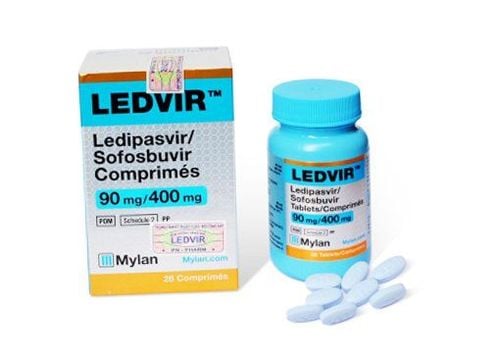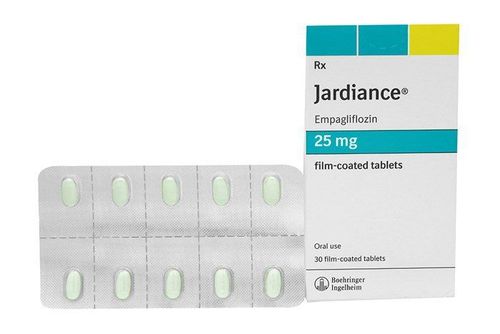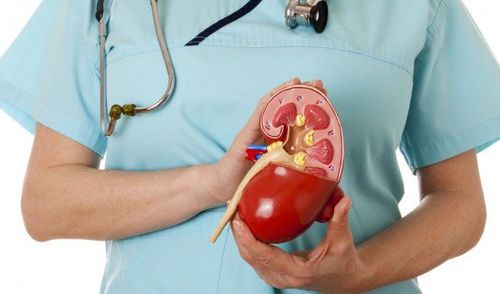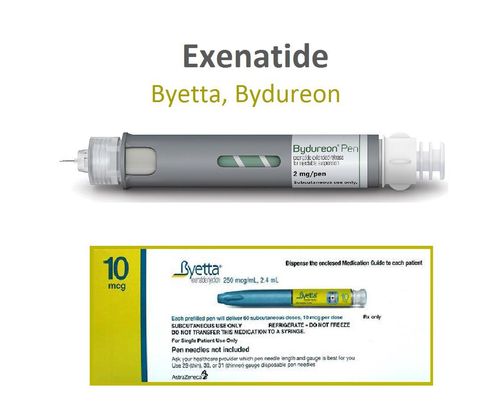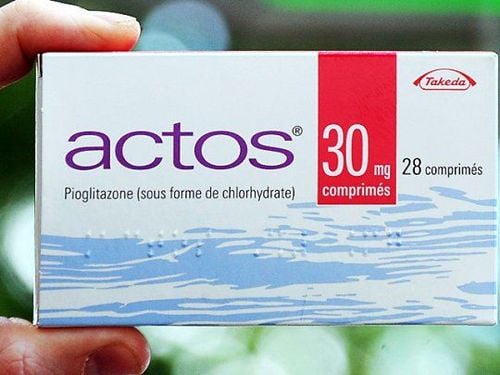This is an automatically translated article.
Diabetic nephropathy is one of the most common complications of diabetes. The disease has no symptoms, by the time it is detected, it is already in the late stages. Therefore, diabetic nephropathy needs to be tested and screened for early detection and prevention of complications.
Complications of diabetes in the kidney include:
Diabetic nephropathy; Atherosclerosis in the kidney; Kidney and urinary tract infections.
1. What is diabetic nephropathy?
Diabetic nephropathy is a condition in which the small blood vessels in the glomerulus are damaged by fibrosis, making this organ ineffective and if left untreated for a long time can lead to kidney failure.
Diabetic nephropathy is a common complication, but it is difficult to detect because there are no symptoms. The features of this diabetes complication are persistent albuminuria, impaired glomerular filtration, and increased blood pressure.
In Vietnam, diabetic nephropathy is one of the main causes of end-stage chronic kidney disease and death. In addition to kidney complications, patients with diabetes can also have problems with the retina, nerves, heart and increase the risk of chest pain, heart attack...
2. Who is susceptible to diabetic nephropathy?
Diabetic nephropathy is more likely to occur in diabetic patients with the following problems:
Older age, male, habit of smoking; High blood pressure, increased cholesterol in the blood, dyslipidemia; Blood sugar disorders, high HbA1c levels; Diet too high in protein; Family history of high blood pressure, diabetes and hereditary kidney diseases.
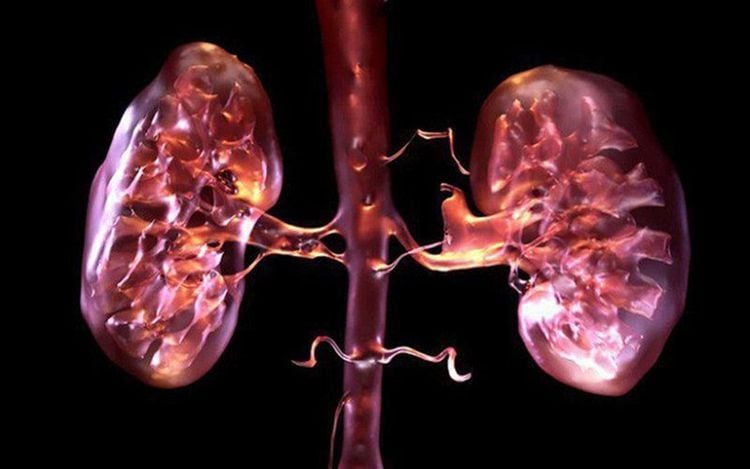
Bệnh thận đái tháo đường là một trong những nguyên nhân chính gây bệnh thận mạn giai đoạn cuối
3. Diabetic nephropathy progression
Diabetic nephropathy can progress through 5 stages in patients with type 1 diabetes who are not treated effectively, specifically:
Stage 1: High blood sugar levels cause blood flow to the kidneys increase. The result is a change in kidney size. Stage 2: The glomerulus begins to have histological changes. The patient has no clinical symptoms. Stage 3: Proteinuria, albuminuria. When detected at this stage, it means that the patient is seriously advanced and if not treated, the complications of diabetes in the kidney will begin to manifest clinically. Stage 4: Proteinuria is more, the filtering function of the glomerulus gradually declines, and high blood pressure appears. Stage 5: End stage of chronic kidney disease, the person may need to treat the disease with dialysis or a kidney transplant.
4. Diabetic nephropathy screening diagnosis
Clinically, early stage diabetic nephropathy is difficult to detect because there are no symptoms. Prolonged albuminuria is the first sign in type 1 diabetes and is accompanied by increased blood pressure in type 2 diabetics.
When it comes to the late stage, new diabetic kidney disease is discovered because there are symptoms of high urea in the blood such as: Nausea, vomiting, poor appetite. Therefore, screening patients with diabetes is very important to detect early complications of diabetes in the kidney.
Diabetic nephropathy is diagnosed with a urinalysis to check for albumin levels in the urine as well as to look for other lesions. In particular, care should be taken in patients with diabetes who have the above-mentioned risk factors. Time to conduct albumin test on each of the following patients:
Type 1: 3 - 5 years after the diagnosis of diabetes. Type 2 diabetes: As soon as diabetes is diagnosed.
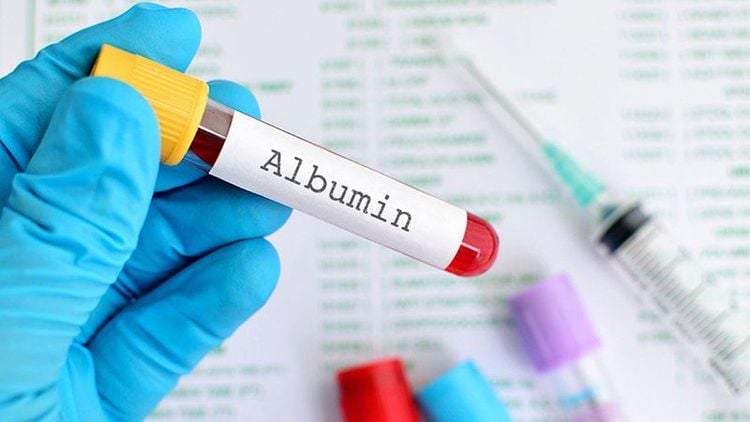
Xét nghiệm albumin để chẩn đoán sàng lọc sớm bệnh thận đái tháo đường
5. Treatment of diabetic nephropathy
Treatment of diabetic nephropathy includes:
Blood sugar control: Maintaining HbA1c below 7.0 for normal blood sugar will help reduce albuminuria. Blood pressure control: Maintain blood pressure below 130/80 mmHg with ACE inhibitors or receptor blockers to help reduce albuminuria and slow disease progression. To achieve the target blood pressure, the patient is prescribed diuretics and the dose is reduced when orthostatic hypotension or blood creatinine levels increase. In case of diabetic nephropathy contraindicated with receptor blockers or ACE inhibitors and blood potassium levels increase, calcium channel blockers may be indicated instead to reduce albuminuria and protect the kidneys. Dyslipidemia: Treatment of dyslipidemia with statins in diabetic patients to reduce the risk of death from albuminuria and cardiovascular problems. Other treatment: Diet should limit protein, increase vitamin D, sodium bicarbonate. Limit salt intake, give fluids and use diuretics to treat edema. Kidney transplant (or pancreas transplant): Performed on patients with end-stage chronic kidney disease. In summary, diabetic nephropathy is a complication occurring in the glomeruli, common in people with diabetes. The disease is difficult to detect in the early stages because there are no symptoms. Therefore, patients need to conduct diagnostic tests to receive early treatment, protect kidney function and reduce the risk of death. In case you want to know how much blood sugar is, what level of diabetes is, patients can sign up for a diabetes screening package, dyslipidemia at Vinmec International General Hospital. Not only health screening, the diabetes and dyslipidemia screening package also helps to detect pre-diabetes early, accurately classify diabetes type, develop a nutritional regimen, and monitor the treatment of diabetes. risks and complications caused by diabetes.
Using the screening package for diabetes and dyslipidemia at Vinmec, customers will receive:
Endocrine CK examination (with appointment) Total urinalysis (by automatic machine) Quantitative Glucose Quantitative HbA1c Quantitative Uric Acid Quantification of Cholesterol Determination of HDL-C (High density lipoprotein Cholesterol) Determination of LDL-C (Low density lipoprotein Cholesterol) Determination of Triglycerides Determination of Urea Determination of Creatinine Measurement of AST Activity (GOT) Measurement of ALT Activity (GPT) Measurement of GGT activity (Gama glutamyl Transferase) Quantification of MAU (Micro Albumin Arine) Echocardiography, transthoracic pericardium, Normal ECG, Carotid Doppler ultrasound, Transcranial Doppler (carotid) Arterial Doppler ultrasound, lower extremity veins (bilateral lower extremity arteries)
Please dial HOTLINE for more information or register for an appointment HERE. Download MyVinmec app to make appointments faster and to manage your bookings easily.




